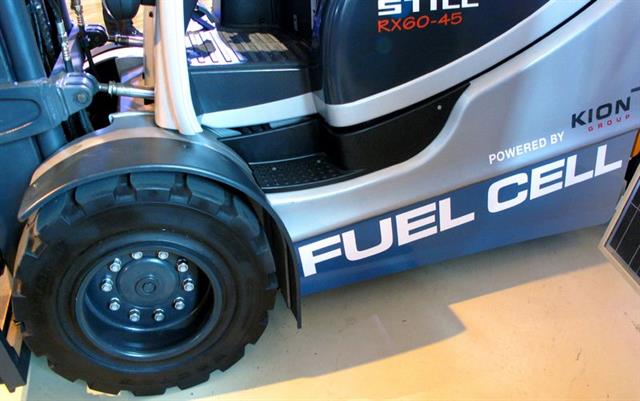 Fuel cells trialed by STILL |
October 8 has been designated as National Hydrogen and Fuel Cell Day to raise broader awareness of the benefits of fuel cell and hydrogen energy technologies.
Fuel cells generate electricity using hydrogen and oxygen in a chemical reaction, with water and heat as the only by-products.
Organisers of the commemorative day point out that hydrogen and fuel cell technologies are being deployed for a variety of applications, including materials handling. They stress that the technologies help reduce greenhouse gas emissions, improve the reliability and resilience of America's energy infrastructure and make the nation more energy independent.
A recent
Forkliftaction.com News special report on energy sources noted that there were 5,000 fuel cell-powered materials handling vehicles operating in North America in 2013. Andy Marsh, chief executive of Plug Power, which has an 85% share of the US fuel cell market, estimates that it is now closer to 6,500.
While the initial outlay for both the fuel cell stack and the infrastructure might be more expensive than a traditional battery set-up, some believe that ROI can be seen within 12 months on larger forklift fleets in multi-shift operations.
Gus Block, director of marketing at Nuvera Fuel Cells, explains that fuel cells can easily be swapped into a forklift's existing battery cavity. He adds that the viability of fuel cell technology for forklift fleets depends on equipment requirements, the duty cycle and other factors. "Hydrogen costs can vary depending on the size of fleet, the cost of utilities and geographic location," he says.
One of the main issues for hydrogen fuel cells has been sourcing, delivering and/or storing of hydrogen for use.
The Investment Tax Credit (ITC) for fuel cells and other energy technologies will expire at the end of 2016. There is a possibility that this incentive may be extended or become permanent. Although the ITC supports early adoption by the market, NMHG and Nuvera are developing advanced power solutions that are intended to provide a value proposition for customers, independent of tax incentives.
And while it is recognised even by fuel cell manufacturers that the technology and marketing has some way to go, the fact that a number of high-profile OEMs including NACCO Materials Handling, Toyota and Linde have been investing in fuel cell technology must surely suggest that there is strong confidence in this energy source, the report concluded.